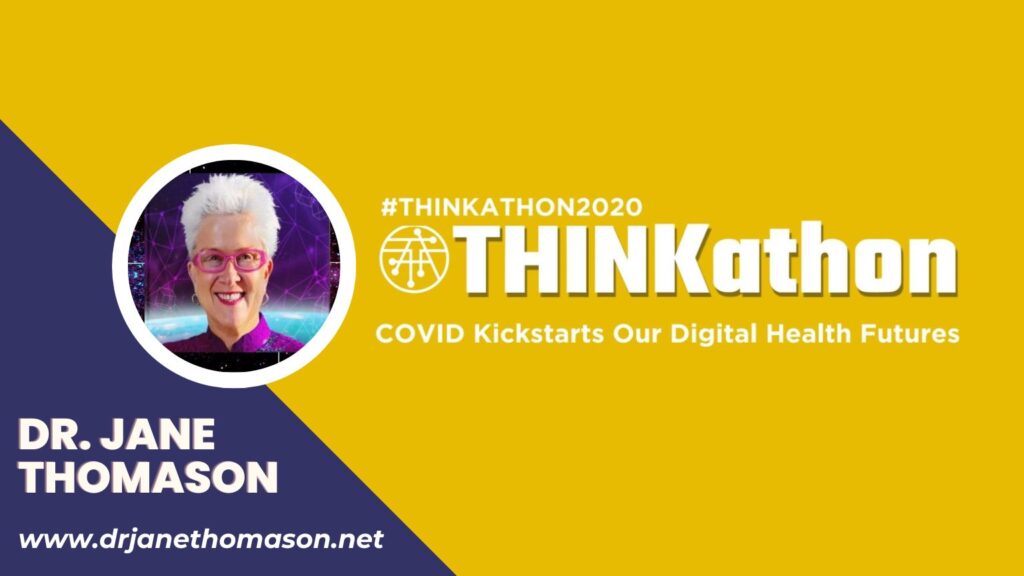The COVID-19 pandemic has gripped the globe in 2020, and it has resulted in unprecedented changes in lives, economies and globalisation. The enforced shift to virtual working, consuming and socializing has generated a seismic shift towards virtual activity – anything that can be done virtually is. There is no part of our lives where this is more true for than health care. Legacy resistance has fallen away far more rapidly as people have sought new means to use technology to facilitate rapid response during the recent COVID-19 outbreak. As previously reported, Covid-19 Is Spurring New Innovations . There are a whole range of solutions emerging in identity, big data , fintech , virtual health, supply chain, and research . The global community has really pulled together by holding more than 20 hackathons around the world, a list of which can be found here. These and many other efforts around the globe are showing how adversity spurs innovation, and that technology is a vital adjunct to both winning the COVID-19 battle as well as helping us plan for the future. The pandemic is the first real test of futuristic and disruptive technologies that have been in development for decades. To leverage the progress made, we look at four powerful trends that will define the health care of the future.
Health Data, a New Global Currency?
Health data will no longer be a passive commodity that is stored in multiple health provider data bases. Individuals and patients will gain more sovereignty over their data in the post-COVID world.
Individuals will become increasingly aware of the value of their own health data, seeking ownership and control. Self-sovereignty will be achieved through ‘empowered collaboration’, where systems are patient-centred and patient-driven, allowing individuals to monitor their own behaviour and incentivising them to behave in healthier ways . Benefits such as the accumulation of social capital and other rewards may be reaped from these behaviours. This will require the development of a decentralised approach to data collection and ownership .
However, these data sets are needed by government, industry and researchers to develop new tools and treatments. Dilemmas remain regarding ownership of data when it has been generated by multiple parties. How can individual data sovereignty be ensured while also allowing its use on a larger scale for the greater good?
In relation to AI, governments may be required to play a role in setting standards and exerting some form of control over the institutions that own the technology, while academia works with these institutions to establish ethical frameworks. The pandemic has also led to a remarkable level of data sharing, and we have seen the willingness of the global health community to share and compare data since the beginning of this crisis . However, the pandemic has also exposed the inherent weaknesses in centralised data collection and management systems. Healthcare systems, which have traditionally been slow to innovate in data management, payments and organisation have felt pressure to collect and produce quality data more efficiently .
Innovation in these areas are essential to governments that wish to implement disease monitoring and sourcing systems effectively, such as trace and track. It will require a collaboration between industry, government and academia to enable the transformation.
“DeHealth” – the New Paradigm
Health will be decentralised and will move away from the dominant paradigm of institutional care to greater treatment in the community. This intersects with the theme of data collection and management, as decentralisation through the use of blockchain will allow better data collection in areas of the world that lack the infrastructure to support their own data collection, storage and management systems. This allows for better data security, transparency, low costs and faster transfer of data in real time, enabling better surveillance, tracking and response to diseases and future pandemics. It also means we can gather information on groups in society which science has previously had few opportunities to study – think of remote communities or those with rare diseases.
Data as a Global Public Good
Access to health and technology will be fundamental to future health in the digital age. Access to online services and infrastructure will be a basic human need, as well as enabling access for individuals to their own data . Future investment in enabling the continuation of telehealth services to remote areas after the COVID-19 pandemic is essential. Blockchain was also mentioned as an important tool for those without infrastructure for data collection, and allows universal access. People have a growing awareness of the value of their health data on both micro and macro scales since the pandemic . Therefore systems based on distributed ledgers that allow control, access and security of individual data, while also allowing its use on a wider scale will be beneficial in both local and global health contexts whether for clinical trials, compliance with treatment, or monitoring of new outbreaks of disease symptoms as just some examples.
Leverage Technological Gains During Acceleration of COVID to Achieve Health in the Digital Age
Don’t stop now! Patients can now migrate from passive consumers to being active contributors, leveraging their health data for their own benefit and for the benefit of humanity. Data is property and digital access will become a basic human right and an indicator of economic and social progress. Digital ecosystems are emerging and the likes of Facebook, Google, and Amazon already have massive user bases, it’s only a matter of time before they make a play in the healthcare space. The new digital health economy is emerging and everyone needs to understand how to accelerate the development of the new health order not only to prevent the next pandemic but also to extract value from their data assets and maximise their own future health.
